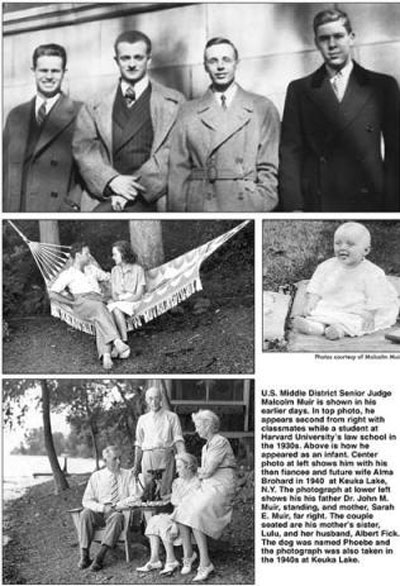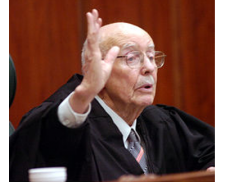Judge Muir's 95 Years
From the October 18, 2009 Williamsport Sun-Gazette
Living the dream: U.S. District Senior Judge Malcolm Muir’s 95-year journey through life and history
By R.A. WALKER
On Tuesday, October 20, 2009, U.S. District Senior Judge Malcolm Muir will begin his 95th year of life.
About a third of those years have been spent as a federal judge, a job he continues to do to this day.
And it's been a long, full life so far for the dentist's son whose earliest recollection is the sound of church bells and sirens.
He was 4 years old and asked his mother for an explanation. "She said the war was over," he recalled, "and your daddy wouldn't have to go."
The date was Nov. 11, 1918. World War I - the war to end all wars - had ended, and two decades later, Muir - by then a successful city-based attorney - would go off to a second world war.
The family lived in Engelwood, N.J., when Malcolm entered this world, the son of a dentist who moved his practice to this city soon afterward.
The Muirs resided at 610 Glenwood Ave. the day the bells and sirens caught the boy's attention. They would move two more times during his childhood- first to Locust Street and then to a house his parents built at 1315 Walnut St.
 Young Malcolm's first city school was the long-gone Vallamont School on Brandon Avenue, a structure that has since become an apartment house.
Young Malcolm's first city school was the long-gone Vallamont School on Brandon Avenue, a structure that has since become an apartment house.
At the time, the neighborhoods on the hill were still part of Loyalsock Township, and for sixth grade Muir attended the former Center School, located in a now-gone building at Grampian Boulevard and Market Street. From there, he entered what is now Curtin Middle School, where his classmates included the late county Judge Charles Greevy.
The world changed dramatically during Muir's school years. Movies began to talk; the Great Depression shattered millions of lives.
He remembers going to see his first sound movie at the Park Theater. The actors were silent, he recalled, but there was background music. Muir said he no longer recalls the title or the names of the actors because bigger things were happening.
He remembers clearly learning about the collapse of the stock market while visiting the home of a friend whose father was Waldo A. Rich, treasurer of the C.A. Reed Co.
Rich called the two of them into the living room to explain the news. "I think it's going to have extremely serious consequences," Muir recalled him saying.
While Muir was a student at Lehigh University, banks were failing. As a safeguard, he withdrew half of what he had in his small account at a bank near the college and sent the money home for safe keeping after learning his father's bank had failed.
Young Muir was unsure of his future during most of his stay a Lehigh. He waited until his senior year to select law as a career and applied for admission to the law school at Harvard University.
He made it into Harvard and survived to earn a degree but was disappointed by his grades.
It was a very hard curriculum, he recalled. "I didn't do well."
According to Muir, Harvard's law school had a tradition at the time of flunking about a third of its students, and each incoming class was reminded that many of them would not last.
Of Muir and his five original roommates, only two of them survived.
Muir said he "barely got through." The other, John F. Kennedy's future postmaster general, James Edward Day, did much better, he added.
After Harvard, the young lawyer returned home and began practicing law, initially in offices shared with John C. Youngman Sr., who would later be instrumental in getting the city's flood-control dikes built.
He married the former Alma Brohard and they raised five children in Muncy, where the couple lived until the 1980s. Mrs. Muir passed away in 1985.
In December 1941, the Muirs were living in a city apartment when war arrived. Muir recalled getting the news of the Japanese attack on Pearl Harbor by telephone from attorney and friend Alfred Jackson and having to ask his friend where Pearl Harbor was located.
Muir joined the Navy in 1942 and went off to the war effort. His first son arrived soon afterward. Following the war, Muir returned and resumed his law career.
"I worked extremely hard," he said, describing a typical work day as beginning with his arrival at his city law office about 4:30 a.m. and lasting until 5 p.m.
Muir said the family had a "fine home" in Muncy - a home which until about 1963 had no television set. Like many parents, the Muirs were concerned television would distract the children from healthier activities such as studying. A television finally invaded the Muir household after a law partner gave the family a set after asking one of the boys what his favorite program was and learning he didn't have a set to watch it on.
As the years passed, culture changes continued to reshape the world at large, but Muir's world remained constant.
He watched the 1960s come and go and didn't take as seriously the cultural changes that occurred. "It didn't impact the way I lived or my family lived," he said.
In the 1970s, President Nixon appointed him a U.S. District Judge - a job he had long set as his ultimate career goal.
During an interview a year ago, Muir said he couldn't imagining any better job and described serving as a senior judge as exactly what he wants as his years advance.
Being a judge, he said, is what he enjoys doing most.
Muir said he is concerned about what is happening in the world, but he respectfully leaves what to do about issues such as the wars in Iraq and Afghanistan "up to the president," who he believes has "done a fine job" to date, "given the circumstances."
He said the president is "remarkably bright and thoughtful" - characteristics recognized when he was elected senior editor of the Harvard Law Review by his fellow editors.
Once a registered Republican, Muir switched to "nonpartisan" when President Ronald Reagan made a series of judicial appointments for reasons with which he disagreed.
Muir has his own personal slant on life; and his greatest influence, he said when pressed, was a piano teacher with "broad interests" named Harold Pries.
"I learned dedication (from him)," he said, describing dedication as working hard and doing your best at "whatever work you're doing."

